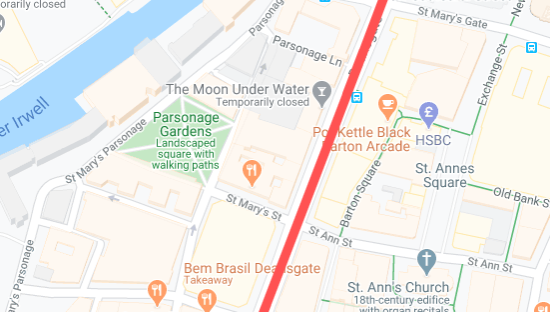How long will bars and clubs in the city centre be closed for and how they will they survive the lockdown financially?
- NQ examines effect covid-19 lockdown is having on pubs and clubs
- We ask students whether they are missing Manchester's rich nightlife
Social distancing is now a part of everyday life for the foreseeable future. In March, Boris Johnson ordered a nationwide shutdown of all pubs, clubs, and bars to combat the pandemic.
This left many owners and catering staff in the lurch indefinitely, having to quickly adapt to changing circumstances in order to stay afloat.
Bars and clubs are at the heart of Deansgate culture, being a busy cosmopolitan district. So how have many adapted almost three months on?
Many iconic locations such as The Deansgate, Revolution, and Slug and Lettuce have remained closed since the order. However, some have found a way to humour and keep spirits high during this dry snap.
Revolution has been hosting live-streams with socially distanced DJs, so that people can still enjoy the party experience in isolation.
Despite some finding humour in the situation, there is still a great deal of uncertainty of how long this shutdown will last. If we look at the timeline Ireland has laid out, we could be looking at closures until at least August.
However, a recently published ‘three step plan’ shows plans to lift restrictions as soon as 4 July in England.
This prolonged shutdown will affect Deansgate greatly, with most of the area being bar and shopping districts.
NQ asked local students whether the shutdown of pubs and clubs will ultimately be for the better or for the worse as far as Manchester is concerned.
Nina Ettridge, 19, law student and part-time musician, said: “I think bars and clubs shutting down for that long would be a massive detriment to society. Everyone needs a place to find their platform or let go and socialise.
“It would also cause destruction to the local music industry, since bars presenting as music venues is a vital part in networking and connecting with fans.”
Sheridan Goswell, 20, a University of Manchester student, said: “I did frequent these venues a lot before lockdown. A good portion of my friends are/were bartenders. It’s difficult to watch them struggle financially without a job.
“However, most of my friends and family are high risk. I would much rather stay at home with Skype calls for the next several months than risk losing them.
“A pint isn’t worth that.”
Callum Martin, 22, also an UoM student, added:: “I think corona has shown I can do mostly without them. But it is sad for some people around me who work in the industry for sure.
“I guess ultimately it’s bad – just because it doesn’t affect me doesn’t mean it’s inherently good.”

Josh Mitchell reports on how furloughed employees are coping.
The UK has now been in lockdown for nearly three months due to the global pandemic of coronavirus. Non-essential businesses, shops, cafes and gyms have been closed across the UK creating ghost towns across the country.
The coronavirus has changed our way of life and has affected every single person living in the UK. It has made our worlds smaller and many of our activities have been taken away from us.
As the death toll surpasses 30,000 nationally, and more than 1,000 deaths in the Manchester region alone, the coronavirus has caused emotional hardship across the country as well as financial hardship.
Businesses have closed their doors to the public for almost two months creating uncertainty for many, wondering when they will be able to get back to normal life.
With the furlough scheme extended until October, many people are wondering how they will survive financially.
Izzy Chambers, 22, is a charity shop worker in Manchester city centre, who is currently on the furlough scheme.
She said: “I personally am on the furlough scheme which means I can’t engage in any work myself, but the company I work for has adapted to the change and begun to create an online shop for the charity.
“This has actually been the perfect opportunity to start this, as I think in the long run it will have a positive impact on the charity, almost modernising it.”
And many students are struggling to adapt to this new way of teaching as many resources offered at university are unavailable.


